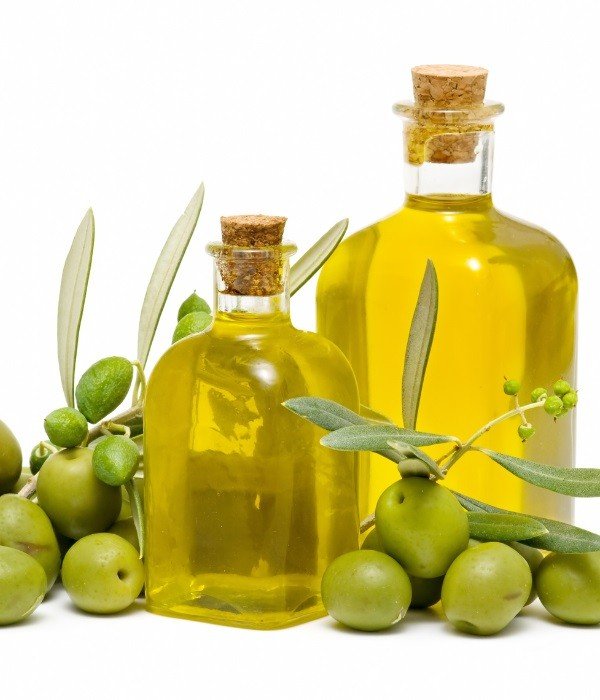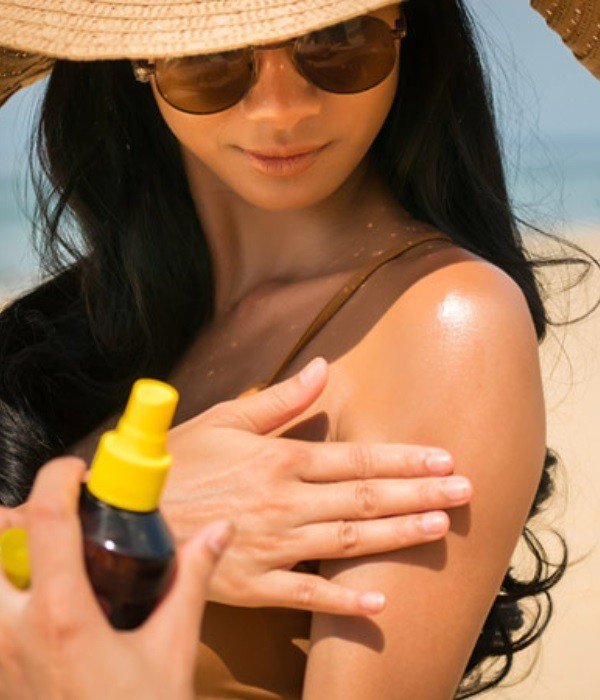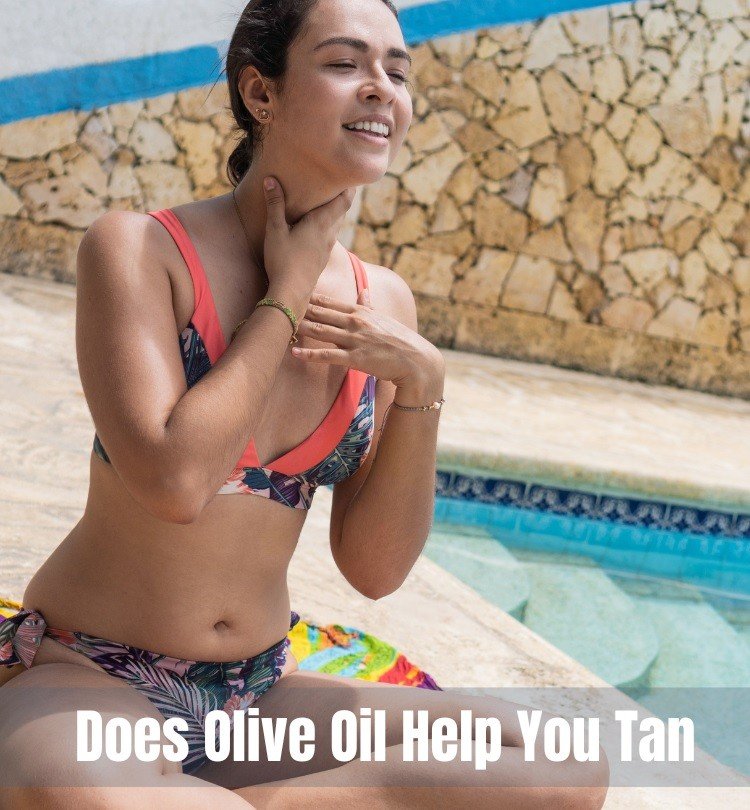This post contains affiliate links.
Updated on April 13, 2025
No, olive oil does not help you tan. Olive oil does not contain enough SPF protection to prevent sun damage or burning.
There are natural oils that have been known to help accelerate the tanning process and keep the skin moisturized. Sun tanning is associated with getting a golden, brownish color on your skin as a result of exposure to UV radiation.
Some people opt for alternative ways to help quicken a tan by making use of natural products like coconut oil, tea, and coffee although some alternative methods have been found to work for some people, it is still crucial to remember that tanning itself is a form of skin damage that can lead to skin cancer, aging, and other skin-related problems.
Contents
The Science Behind Tanning
If you’re looking for a natural way to get that sun-kissed look, you may have heard that olive oil can help you tan. But is there any truth to this claim? We’ll explore the science behind tanning and whether olive oil can enhance the process.
The Role Of Melanin In Tanning
Melanin is a pigment that gives color to the skin, eyes, and hair. It’s produced by cells called melanocytes, which are located in the top layer of the skin. Melanin serves as a natural sunscreen, protecting the skin from UV damage.
How Uv Rays Affect Your Skin
When your skin is exposed to UV radiation from the sun or tanning beds, it triggers the production of melanin. This process, known as melanogenesis, helps to protect the skin from further damage by absorbing UV rays. Excessive sun exposure can cause DNA damage to skin cells, leading to premature aging and an increased risk of skin cancer.
Factors That Affect Your Skin’S Ability To Tan
While everyone’s skin contains melanocytes, not all skin types respond to UV radiation in the same way. Several factors can influence a person’s ability to tan, including:
- Skin type: People with fair skin are more susceptible to sunburn and may not tan as easily as those with dark skin.
- Age: As we age, our skin becomes thinner and less elastic, making it more sensitive to UV radiation.
- Medications: Certain medications like antibiotics and birth control pills can increase sun sensitivity and make it harder to tan.
- Genetics: Some people are naturally more likely to tan than others based on their genetic makeup.
While olive oil may provide some moisturizing benefits to the skin, there is no scientific evidence to support the claim that it enhances tanning. The most effective way to get a healthy-looking tan while protecting your skin is to use sunscreen and limit your exposure to UV radiation.
By understanding the science behind tanning and taking proper precautions, you can enjoy the benefits of the sun without putting your skin at risk.
Related: How Long Do Tanning Lotions Last?
Olive Oil: A Natural Tanning Agent

There are numerous ways to achieve a sun-kissed look, and it’s no secret that many options on the market can harm your skin. So, is there a way to tan naturally without risking your skin’s health? Yes, there is! Olive oil is a great option, and here are the reasons why.
How Olive Oil Can Help Improve Your Skin’s Ability To Tan?
Olive oil has been used for centuries for its moisturizing properties, and in recent years, people have discovered that it can also be used to enhance tanning. Here are some key points to keep in mind:
- Olive oil contains monounsaturated fatty acids that moisturize your skin and help it tan better.
- The natural oil contains polyphenols, which can keep your skin healthy and smooth.
- Olive oil has a low SPF, which can allow you to tan while still getting some protection from the sun’s harmful rays.
Anti-Inflammatory And Antioxidant Properties Of Olive Oil
Another great thing about olive oil is its anti-inflammatory and antioxidant properties, which can help protect your skin from damage. Here’s what you need to know:
- Olive oil has antioxidants that can protect your skin from the sun’s harmful rays.
- It can also help reduce inflammation caused by sunburn.
- Olive oil can moisturize and nourish your skin, keeping it healthy and smooth.
The Benefits Of Using Olive Oil Over Traditional Tanning Agents
If you’re considering using olive oil to tan, keep in mind the benefits of doing so over traditional tanning agents. Here are some key points to know:
- Olive oil is a natural product, which means you’re not putting harsh chemicals on your skin.
- Olive oil is widely available and affordable, making it an accessible option for most people.
- You can customize your tanning oil by adding your favorite essential oils to make it smell great.
Olive oil is a fantastic natural tanning agent that can enhance your skin’s ability to tan while also providing many other benefits. Give it a try and see how it works for you!
The Risks Associated With Using Olive Oil For Tanning

We’ll also suggest some alternatives for those with sensitive skin.
Related: How To Use Contour Kit?
Can Olive Oil Increase Your Risk Of Skin Cancer?
Despite its natural origins, using olive oil for tanning can be risky due to its impact on skin health. Olive oil is not a sunscreen, and it has a low SPF factor. Therefore it is not the right choice to protect your skin from the harmful rays of the sun.
Using olive oil for tanning can actually increase your risk of skin cancer as it speeds up the tanning process, allowing your skin to be exposed to the sun for longer than it usually would. The longer your skin is exposed to the sun, the greater its risk of sunburn, premature aging, and skin cancer.
The Potential For Skin Irritation And Allergic Reactions
While using olive oil for tanning is natural, many people are allergic to it, which can result in painful skin reactions. Olive oil contains oleuropein, which can cause allergic reactions, such as itching, redness, and swelling. Applying olive oil on sunburnt skin can be especially dangerous, as it can cause blisters and peeling, leading to further skin damage.
Additionally, olive oil can clog pores and lead to acne breakouts, causing a host of other skin problems.
Some Alternatives To Olive Oil For Those With Sensitive Skin
Fortunately, there are many alternatives to olive oil that can be used for tanning. Some of the best options for those with sensitive skin include:
- Sunscreen with an SPF of 30 or more
- Self-tanning lotions
- Bronzing powders
- Tinted moisturizers
These alternatives offer safe, sun-free ways to achieve a bronzed appearance without the risks of skin cancer and skin irritation that come with using olive oil for tanning.
Olive oil may have some moisturizing properties that make it an attractive option for those looking to achieve a sun-kissed glow. It comes with many risks that cannot be ignored. It’s essential to protect your skin from the harmful rays of the sun using sunscreen or other safe alternatives, rather than relying on olive oil for tanning.
So, always take care of your skin and use the right products to achieve the desired result.
How To Use Olive Oil For Tanning?

Using olive oil for this purpose requires a bit of careful consideration.
The Best Way To Apply Olive Oil To The Skin
Here are easy steps to follow when applying olive oil to achieve an impressive tan:
- Firstly, apply your preferred sunscreen product such as SPF 30 on your skin, take a shower and dry your skin.
- This step is optional, but if you wish, you can mix a few drops of coconut oil with olive oil.
- Pour a small amount of olive oil into your palm and spread it evenly on your skin, ensuring each area is well moisturized. Be careful not to over-apply the oil to avoid a greasy look.
- For those hard-to-reach areas, such as your lower back, ask someone for help.
- Wait for the olive oil to absorb into your skin for at least 30 minutes before venturing out in the sun.
Amount Of Olive Oil To Use
It’s always essential to consider the amount of olive oil to use, as using too much or too little may affect your skin’s health. The recommended amount of olive oil to use is a few drops for each area of your skin.
Here’s a breakdown of the recommended amount for each body part:
- Face: 2-3 drops
- Arms: 6-8 drops
- Legs: 8-10 drops
- Back: 10-12 drops
Related: How To Use Smashbox Contour Kit?
Tips For Achieving The Perfect, Natural-Looking Tan
Using olive oil for tanning requires a bit of care and attention to achieve the best results. Here are some tips for achieving a perfect, natural-looking tan:
- Try to avoid spending time in the sun during peak hours (between 10 a.m. and 2 p.m.) to minimize the risk of sunburn.
- Drink plenty of water to keep your skin hydrated while spending time in the sun.
- Exfoliate your skin before applying olive oil to remove any dead skin cells that may affect the overall outcome.
- Don’t expect immediate results; remember, tanning is a gradual process. It may take several sessions to achieve your desired shade.
- Once you achieve your desired shade, ensure to moisturize your skin afterward to maintain it.
Using olive oil for tanning can be an affordable, natural, and effective method to get a beautiful tan, as well as numerous health benefits. By following our guidelines on ‘how to use olive oil for tanning,’ you can achieve your desired shade without compromising your skin’s health.
Frequently Asked Questions
Can You Use Olive Oil Instead Of Sunscreen?
No, olive oil cannot replace sunscreen as it does not provide enough protection from harmful UV rays.
How Does Olive Oil Affect The Skin?
Olive oil can help to moisturize, nourish and protect the skin as it is rich in vitamins, antioxidants, and healthy fats.
What Are The Benefits Of Using Olive Oil For Tanning?
Using olive oil for tanning can help boost your tan, moisturize your skin, and protect it from the sun’s harmful rays.
How To Use Olive Oil For Tanning?
Apply a thin layer of olive oil on your skin before the tanning session, reapply after 1-2 hours and make sure to use sunscreen with SPF 30.
Conclusion
After researching the potential benefits and drawbacks of using olive oil as a tanning oil, it is safe to say that there are conflicting opinions on the matter. While some believe that the oil can enhance the tanning process due to its moisturizing and antioxidant properties, others caution against its use due to its potential to cause skin damage and contribute to skin cancer.
It is important to heed the warnings of dermatologists and to always prioritize sunscreen and protective measures when spending time in the sun. Ultimately, whether or not you choose to use olive oil as a tanning oil is a personal decision that should be made after careful consideration of the potential risks and benefits.
In any case, it is important to stay informed and take care of your skin to maintain a healthy and radiant complexion.

